|
|
|
Sort Order |
|
|
|
Items / Page
|
|
|
|
|
|
|
| Srl | Item |
| 1 |
ID:
133389
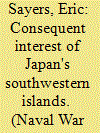

|
|
|
|
|
| Publication |
2014.
|
| Summary/Abstract |
In his classic collection of essays on maritime geography The Interest of America in Sea Power, Present and Future, Alfred Thayer Mahan opined that the importance of "portions of the earth's surface, and their consequent interest to mankind, differ from time to time."1 Just as the Mediterranean Sea once transfixed the minds of European strategists and policy makers, Mahan believed, at the turn of the twentieth century, the Gulf of Mexico and Caribbean Sea would obtain similar prominence in American strategic thinking. A century later, as we observe the relative balance of economic and military powers shifting to Asia and the Pacific and Indian Oceans, Mahan's teachings on geography are again instructive, as once seemingly insignificant bodies of water and island chains take on a new importance in regional security matters.
|
|
|
|
|
|
|
|
|
|
|
|
|
|
|
|
| 2 |
ID:
133392
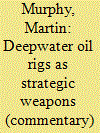

|
|
|
|
|
| Publication |
2013.
|
| Summary/Abstract |
The author discusses his concerns with the possible use of deepwater oil rigs by the Chinese as strategic weapons as of Spring 2013. He analyzes remarks made by China National Offshore Oil Corporation (CNOOC) chairman Wang Yilin concerning the concept of deepwater rigs as mobile national territory. The author discusses several aspects of his concerns including Chinese mercantilism, CNOOC's state-directed role in the advancement of Chinese interests, and Chinese observance of jurisdictions and regulatory requirements.
|
|
|
|
|
|
|
|
|
|
|
|
|
|
|
|
| 3 |
ID:
133393


|
|
|
|
|
| Publication |
2013.
|
| Summary/Abstract |
This work begins in the early twentieth century, when Great Britain stood at the center of the first modern global economy. The dream of British free-trade liberals was coming true; world trade was expanding, and economists, financiers, and business leaders in many nations were working to eliminate tariff barriers and expand international trade and finance. Three things made this expansion possible. The large British steam-powered merchant marine, watched over by the Royal Navy, was making it possible for buyers and sellers of many goods to have confidence that products would be shipped on time. Second, as Nicholas Lambert observes in Planning Armageddon: British Economic Warfare and the First World War, the "huge explosion in international trade after 1870 was made possible largely by the development of the London credit market," which allowed vendors to ship goods to purchasers on the guarantee that payment had been made and would find its way through London to the vendors' banks. Third, the creation of reliable submarine cables allowed vendors, purchasers, and banks to communicate almost instantaneously across whole oceans, facilitating the various messages that in their turn made international commerce possible.
|
|
|
|
|
|
|
|
|
|
|
|
|
|
|
|
| 4 |
ID:
133391
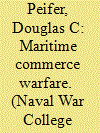

|
|
|
|
|
| Publication |
2013.
|
| Summary/Abstract |
Maritime commerce warfare" has a distinctly dated whiff. The great Anglo- American naval theorists of the late nineteenth and early twentieth centuries-the Colomb brothers, Alfred Thayer Mahan, and Julian Corbett-all dismissed it as an indecisive strategy of the weak. Imperial Germany's turn to unrestricted submarine warfare in 1917 failed to achieve its political purpose, instead bringing the United States into the war just as war weariness and revolution threatened to undermine the Entente's military effectiveness. In the Second World War, both Germany and the United States used the submarine with deadly effectiveness against the maritime supply lines of their enemies, but even the more effective of their campaigns-that of the U
|
|
|
|
|
|
|
|
|
|
|
|
|
|
|
|
| 5 |
ID:
133387
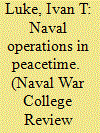

|
|
|
|
|
| Publication |
2013.
|
| Summary/Abstract |
The article discusses U.S. naval operations in peacetime conditions as of Spring 2013. It argues that naval planners, theorists, and practitioners should adjust their approaches to peacetime naval operations, and that naval theory is not appropriate for peacetime missions. The article discusses the impact of globalization on maritime commerce, the evolution of criminal and military threats to U.S. national security, and the changing nature of international maritime law. The author presents an alternative framework aimed at reconceptualizing naval operations from peacetime to a war footing.
|
|
|
|
|
|
|
|
|
|
|
|
|
|
|
|
| 6 |
ID:
133390


|
|
|
|
|
| Publication |
2013.
|
| Summary/Abstract |
The Arctic, during the Cold War a locus of intense military competition between the United States and the Union of Soviet Socialist Republics, is rapidly reemerging as a geostrategic flash point. As accelerating climate change melts the Arctic's perennial sea ice, littoral as well as peripheral actors are preparing to exploit emergent economic and strategic opportunities in the High North. Although the possibility of armed conflict over Arctic resources has been somewhat discounted, a fair amount of saber rattling in recent years among the "Arctic Eight"-the United States, Russia, Canada, Denmark, Finland, Iceland, Norway, and Sweden-has given rise to the notion that circumpolar security actors may be priming for a "new kind of Cold War" in the North.
|
|
|
|
|
|
|
|
|
|
|
|
|
|
|
|
| 7 |
ID:
133388
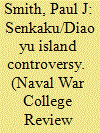

|
|
|
|
|
| Publication |
2013.
|
| Summary/Abstract |
On 11 September 2012, the Japanese government signed a contract worth 2.05 billion yen ($26.1 million) with Kunioki Kurihara, a private businessman, to purchase three of the five main islands that constitute the Senkaku/ Diaoyu Island group, an action that effectively nationalized the islands.1 Ironically, the government purchase was designed to head off more ambitious moves by Tokyo's governor (?????), Shintaro Ishihara, to purchase the islands with cash collected in a national fund-raising campaign. Ishihara, known for his nationalistic views, had told an American audience in April 2012 that the "Senkaku Islets will be purchased by the Tokyo Metropolitan Government . . . [and] we will do whatever it takes to protect our own land."2 Not surprisingly, the Chinese government viewed Japan's island-purchasing activities, whatever their motivations or sources, as severe provocations that required a firm and immediate response.
|
|
|
|
|
|
|
|
|
|
|
|
|
|
|
|
|
|
|
|
|